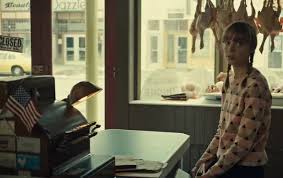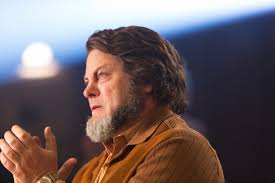“It’s pretty depressing.”
“Really? See, I think it’s beautiful.”
Noreen and Charlie are talking about Albert Camus with this exchange, but it’s just as applicable to the classic O. Henry story that gives “The Gift Of The Magi” its name. The end of that story, with the couple exchanging thoughtful presents that have each been rendered useless by what the recipient had to give up in order to secure their gift, can be seen as a bleak joke on the futility of all human endeavor, no matter how noble the intentions. Or, if you believe that the purpose of a gift is not to provide a tangible benefit but simply to demonstrate that you care, then the “joke” is actually a wonderful validation of that relationship. Those two had to be perfectly attuned to reach such a uniquely bad result. That synchronicity is beautiful, even if the circumstance is sad.
I wouldn’t necessarily call Fargo a beautiful show, though it is very well shot, as its grace notes tend to be subdued rather than flowery. And it’s certainly hard to call “The Gift Of The Magi” beautiful, as it is the bloodiest episode of an always-violent show, by a wide margin. Skulls are cleaved, feet blasted off at the ankle, throats graphically cut, and heads put in hat boxes. And that’s without getting into Milligan sexually threatening Dodd’s daughter (who the internet tells me is named Simone, though I don’t recall hearing the name on the show), or how Dodd himself physically threatens her, or how nastily he insults his brother Bear. This is as ugly as the show gets, and yet those grace notes still shine through, however spottily. It’s in the underplayed interactions of the Solverson clan, Floyd’s protection of her granddaughter, Peggy making her first truly selfless (if ultimately pointless) decision to put Ed’s dream ahead of her wanderlust, Ben’s implicit apology to Lou and the way Lou responds by casually offering help rather than making him squirm, or how young Noreen, for all her affectations to being the goth queen of Luverne, guilelessly stirs Charlie’s compassion just by being a self-evidently nice gal.
The attempted hit at the butcher shop is Fargo operating at its absolute best, blending queasy humor and Minnesoooooootan affability with undercurrents of brutal violence, and mining a terrific amount of suspense from the intersection. And Noreen is the key to it all. Because from a distance, it should be obvious how this plays out. While many of us have theorized that Ed could predecease his wife by an episode or two, he is clearly the most important player in this scenario. He’s one of the headliners of his storyline, and the fact that Dodd sends a henchman to guide his nephew through his first kill (to avenge his own brother, no less) makes less sense as a character decision than a concession that the writers aren’t ready to put him in a “one man leaves” scenario with another principle just yet. Which, along with Charlie being the 5th or so most prominent Gerhardt, telegraphs pretty hard that Ed is going to make it out of this.
And yet, there is still so much tension, because of Noreen’s presence. She’s a wildcard, as this is not a show that shies away from merking innocents (see the Waffle House, or the fate of a certain Mrs. Nygard last year), and she is not so well-developed as to be afforded any sort of sovereign immunity relative to the other characters. So even if you’re convinced that Ed is not in any real danger, there’s another level of plausible threat that hums throughout the entire build-up. The writing is wonderfully observed, and Emily Haine is terrific at showing how quickly and unconsciously this girl sheds the pretensions she was trying on a moment earlier, as teenagers are wont to do. She’s just old enough to begin to grapple with existential cynicism, but too young not to be innately optimistic about the chance to interact with a cute boy. It’s immediately endearing, which in turn makes things immediately more fraught, as she’s oblivious to the other level of which we and Charlie are acutely aware.
And it’s all about perception, isn’t it? Whether Camus or O. Henry or the Coens’ works are beautiful or depressing or both is in the eye of the beholder, and to a certain extent, this allows us all to shape our own reality. We are doing this constantly, unconsciously, and it’s amazing and magnificent and dangerous when we get carried away and start thinking that the ability to mold our own subjective reality to our preference is an actual superpower that means we can change the outside world just by believing really hard. That way leads us to mystical bullshit like The Secret, and to Ronald Reagan.
Reagan is an oddly elusive figure for someone who lived so prominently and so recently. I was alive for at least some of his presidency, and yet, I don’t have any sense of who he actually was, the way I feel (however erroneously) that I know what sort of guys his successors were/are. A significant segment of today’s conservatives look back on him as something better than the Second Coming. They view his tenure through a soft focus lens of nostalgia as the Last Time America Was Great, which leads to a weird double-distortion effect because Reagan himself ran on a rose-colored vision of taking us back to a simpler time past. And being a liberal, I also think he is responsible for a lot of domestic policies that are still having devastating consequences for multiple generations, and things like Iran-Contra are an absolute disgrace. So I’m more than a little suspicious of the efforts to deify him.
And yet, even I have to admit that he drew the most dangerous conflict in human history to a close, and that it may not be hyperbole to say doing so averted the extinction of the human race. And as fan of the human race (some of y’all ain’t bad looking), I have to give that some props. But he did so by spouting some pretty shameless propaganda about Evil Empires and so forth, when the Soviet Union was already fast crumbling within. Maybe he was a savvy enough operator to recognize that some inflammatory rhetoric would speed things along, or maybe he just saw that the game was close enough to over that he could score cheap easy points taunting an opponent that was already on the mat. Maybe he just had a knack for knowing exactly what America needed to hear, or maybe he wholeheartedly believed every word of what he said.
That is the essential enigma of Reagan for me: there’s no denying that he was beyond successful as a politician, but to what degree did he buy into his own line? His famous “city on a hill” rhetoric is all about projecting appearances; the city doesn’t actually have to be Shangri-La, it just has to pass for it from below. But it is undeniably powerful rhetoric. Everyone is affected by it – Lou, Betsy, Constance (none of them simpletons or particularly soft touches), even the proudly paranoid Karl Weathers. Whether its gospel truth or a line is practically irrelevant. The imagery is important, because perception is important. He’s selling a comeback narrative, and everyone loves that, like they love Rocky.
What’s genius about Bruce Campbell’s Reagan is that the performance, in addition to not going overboard trying to be either an imitation or caricature, never indicates just how full of shit he really is. Obviously, we’re supposed to take his reminiscing about making war movies as if it was actual combat to be ridiculous. But is he wrong when, forgetting the ending of that particular “mission”, he concludes “ah well, either way, it was a fine picture.”? It’s soldiers that win wars, but propaganda has played a major role in every successful war effort in history, because it shapes those all-important perceptions. Whose to say that a movie star who becomes the face of a such a war effort doesn’t contribute as much as any one foot soldier to that cause? And a president’s duty is so tied to public opinion that projecting the right image is arguably the most important aspect of the most important job in the world.
But even when his line of patriotic patter fails to reassure Lou completely, it’s still unclear whether this guy is an idiot savant or a Machiavellian genius who simply decides chasing this one sale isn’t worth the trouble. I don’t buy that either the real or fictional version of the man is dumb enough to believe that ketchup is actually a vegetable, but is saying so the height of cynicism? Or is there something perversely optimistic about thinking that if we could get everyone to go along with that idea, that’d be just as good?
Of course, there are limits to this sort of magical thinking. The 70s were always going to come in like a hangover, the killers are still coming even if you still think it’s Tuesday, and Betsy might feel a little more relief if she thought her Smartees were medicine, but she’d still be dying just as fast. Same as you and me, and Ed’s grandpa. Just ask Camus.
Okay then. On to Coen Bingo and other random shit:
COEN BINGO AND OTHER RANDOM SHIT
– I didn’t catch any direct quotes, but all this talk about perspective has reminded me of the meeting with the junior rabbi from A Serious Man. “Just look at that parking lot…”
– The exchange in that clip about how “The Boss may not always be right, but he’s always the Boss,” calls to mind Lou and Betsy’s skeptical words about his boss. “He knows best. Probably.” “Said he did, anyway.” Meanwhile, Reagan is boarding his bus to give another speech.
– Molly is apparently drawing the UFO now. Little sucker sure gets around.
– About the only knock I have on the episode is that both Dodd and Hanzee act out of character at points. Dodd sending a stand-in with Charlie is addressed above. Hanzee slashes one Kitchen Brother’s throat, but settles for merely punching out the other a half second later? It’s like he’s trying specifically to preserve a more dramatic confrontation down the line. Perhaps as a Native American, he’s simply more naturally attuned to the ebbs and flows of seasonal arcs?
– It’s dumb, but I get a kick out of “Erstwhile on Fargo” as opposed to “Previously”. And this week it drew attention to another thing that is great – the subtle Minnesotan lilts that sneak into Zahn McClarnon’s gravel-voiced portrayal of Hanzee. Most of the accentwork on this show (Jeffrey Donovan, looking at you in particular) are miles from subtle, but the occasional “ya” that slips out of this stone killer, particularly when interacting with his adopted family, do a lot to suggest that he may have been born apart from these honkies, but he was bred amongst them, and it’s left it’s mark.
– Giggly Nick Offerman is a delight. Glad they found time (not that FX puts any pressure on its originals in that regard) to include his little mancrush on ol’ Dutch.
– I brushed past Milligan above, but he chooses to view Joe’s severed head as an opportunity to climb the ladder rather than signal to give up, just as he chose his own devilish brand of optimism as a rebuke to his mother’s oppressive gloominess. He also knows the relevant question to ask Simone – “what are we, in your mind?” He knows they aren’t actually Romeo and Juliet, but what matters is whether she thinks that way.
– I like the parallel of Bear thanking Hanzee for his service to the Gerhardt family, with more conviction than Dutch thanks Lou for his.





